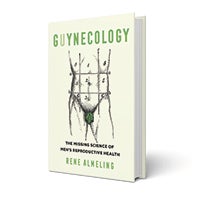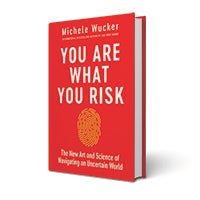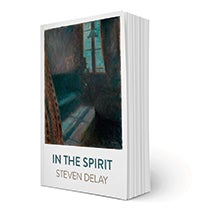Alumni Books and Music
Winter 2022

GUYnecology
The Missing Science of Men’s Reproductive Health
Rene Almeling ’98
University of California Press, 2020
Pregnant women are bombarded with information about how their age, diet and environment could affect their child’s development. It may come as a surprise that these factors matter when it comes to fathers as well. Faced with a new spate of research demonstrating the crucial role men play in reproductive outcomes, Yale University sociologist Rene Almeling wondered: Why are researchers just now beginning to ask these questions? She explores the implications in her new book, “GUYnecology: The Missing Science of Men’s Reproductive Health.”
Why are we just finding out how men’s age, health and exposure to toxins can affect the health of the children they father?
Reproduction and reproductive politics have long been portrayed as “women’s issues.” But in recent years, an increasing number of studies have shown how paternal age and the health of men’s bodies at the time of conception can affect not only sperm count and motility, but also the genetic material inside sperm. This is important new information about how men’s health might affect reproductive outcomes, such as miscarriage, birth defects and even childhood illnesses.
You write about a 19th-century effort to launch “andrology” as a medical specialty. It didn’t catch on, although gynecology obviously did. Why not?
Obstetrics and gynecology were among the first medical specialties to emerge in the U.S., near the end of the 19th century. The book’s first chapter chronicles an 1880s attempt by elite physicians, mostly from New York City, to launch a parallel specialty for men called andrology. The founders were ridiculed, mostly because men’s sexual and reproductive health at the time was dominated by highly stigmatized sexually transmitted diseases. To this day, there is still no unified specialty focused on men and reproduction. As a result, there is a relative lack of public health attention to men’s reproductive health. For example, men still have the same two contraceptive options they had at the end of the 19th century: condoms and vasectomy.
It seems like people are talking more openly about infertility issues, but it’s still a conversation that’s focused on women. Will this change?
I hope so. I interviewed 40 diverse men from the general public about reproduction and sperm. They had not heard that their age and health can affect sperm and, in turn, their children’s health. Most didn’t know that sperm take two to three months to grow in the male body, which is the key window before conception when their behaviors and exposures probably matter most. They didn’t know that with every passing year, older men are more likely to develop new mutations in their sperm, which have been linked to an increased risk of autism and schizophrenia in their children. In fact, most of the men I spoke with said the last time they heard anything about their own reproductive systems was in high school.

When the Earth Had Two Moons
Cannibal Planets, Icy Giants, Dirty Comets, Dreadful Orbits, and the Origins of the Night Sky
Erik Asphaug ’85
HarperCollins Publishers, 2019
Celestial bodies are bad drivers. They collide with each other at high velocities and then may cling together for perpetuity or speed away, trailing debris, in a series of interstellar hit-and-runs. Erik Asphaug, a planetary science professor at the University of Arizona, studies space crashes like these, which created the planets and moons of our solar system.
One mystery that has puzzled researchers like Asphaug is why the planets, comets and asteroids near Earth have such different compositions — as do the two halves of our moon. In “When the Earth Had Two Moons,” he works to unravel that mystery, which has driven much of his own research. “If planets were born out of clouds of primeval material orbiting the Sun, then why aren’t they more or less the same, like so many raindrops condensing from a cloud, or like so many bales of hay piled in a mowed field?” he asks in the introduction. “Without getting ahead of my story, let’s just say that nearly every planet and moon that ever existed in the solar system was consumed by something bigger than itself, and that makes all the difference in the world.”

You Are What You Risk
The New Art and Science of Navigating an Uncertain World
Michele Wucker ’89
Pegasus Books, 2021
Michele Wucker’s grandmother brazenly ignored health risks: She once refused surgery for an abdominal aneurysm until it had grown to roughly the size of an orange. Her high tolerance for risk often had harmful consequences, such as when she threw her back out in an attempt to lift a huge TV, by herself, in her mid-80s. Wucker, a leadership strategist and former think tank executive, has spent much of her career studying why people ignore obvious risks — like those an octogenarian faces when lifting heavy objects — and how to get them to recognize their own vulnerabilities.
Wucker’s last book, “The Gray Rhino,” explored how neglecting risks could lead to crises for companies and entire countries; her new book, “You Are What You Risk,” examines the issue from a personal level. “What makes the difference between people who act and the ones who freeze in the face of risks and crises in their own lives?” she asks. The book explores how our personalities shape our sensitivity to risk, along with the cognitive biases and moods that can affect our ability to judge the right response. More crucially, Wucker outlines the ways we can create better “risk habits” to avoid charging headlong into dangers we could easily avoid.

In the Spirit
A Phenomenology of Faith
Steven DeLay ’13
John Hunt Publishing, 2021
In a series of essays combining philosophy, theology, biblical analysis and art criticism, Steven DeLay explores the foibles and follies of the human experience and the transcendent power of faith. Taking a dim view of worldly pursuits and what he describes as “the stupor in which we grope when we are estranged from God,” DeLay argues that faith is the only way to avoid a life of fruitlessness and frustration. “Existence assumes the form of faith,” he writes, “for it becomes a task of stretching forth, a perpetual exodus always in patience seeking after the heavenly city, rather than turning back to idle aimlessly where it had begun.”
DeLay teaches at Woolf University, a virtual institution launched by a group of Oxford University scholars in 2018 as the world’s first “blockchain university,” with the goal of eliminating academic bureaucracy and offering a one-to-one educational model intended to be more accessible than traditional higher education. He earned a master’s degree in philosophy at Rice in 2013 and a Ph.D. at Oxford in 2017.

With Malice Toward None
Apollo Chamber Players
Azica Records, 2021
In “With Malice Toward None,” the Apollo Chamber Players have channeled the frustrations and fears of the past two years into art that addresses the social and cultural issues of our time, infused with hope for the future. The album derives its title from Abraham Lincoln’s phrase “with malice toward none, with charity for all,” and its 16 globally inspired compositions celebrate American culture and the resilience of the human spirit. Apollo’s core musicians — Matthew J. Detrick ’03 (violin), Anabel Ramirez Detrick (violin), Whitney Bullock ’07 (viola) and Matthew Dudzik ’04 (cello) — are true Space City citizens. In its 14th season, the quartet partners with schools, youth centers, refugee and veterans service organizations, hospitals, airports and libraries to bring live music performances to underserved audiences.
— Jennifer Latson
